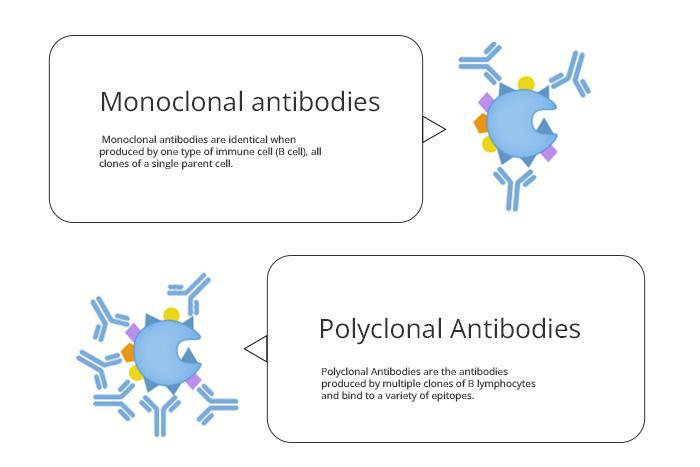How do Polyclonal Antibodies work, and what are their uses?

Antibodies, also known as immunoglobulins (Ig), are essential components of our immune system. They fortify the body’s immune system to combat bacterial, viral, or antigenic infections and prevent them from impacting human cells.
Antibodies are Y-shaped immunoglobulin molecules (Ig) produced by B lymphocytes or plasma cells that activate the primary response of the adaptive immune system when they detect a foreign molecule. Because antibodies can bind antigen epitopes (the region of an antigen to which an antibody binds) with high affinity and precision, they are vital to host immunity and useful in research and medicine for treating disease and improving health.
Today, synthetic antibody therapies (that replicate and act like natural antibodies) are being constantly researched by labs worldwide. Polyclonal and monoclonal antibody therapies have become essential in the field of clinical research.
When scientists replicate or clone an antibody in a lab, the antibodies thus created are called monoclonal antibodies, or monobodies. On the other hand, a combination of distinct antibodies made by various B lymphocyte lineages results in polyclonal antibodies. Given the variations in specificity and affinity, these antibody therapies offer scientists distinct methods for detecting or quantifying target antigens.
In this article, experts at Helvetica Health Care (HHC) explain polyclonal antibodies, how they work, and their wide range of applications in clinical research and diagnostics. To learn more about the differences between monoclonal and polyclonal antibodies, please read our previous article.
What Are Polyclonal Antibodies?
Polyclonal antibodies are a group of antibodies produced by various B cells in response to an antigen, a molecule that initiates an immune response. In contrast to monoclonal antibodies, which are generated from a single clone of B cells, polyclonal antibodies are produced from a diverse population of B cells, each of which recognizes a distinct epitope (specific binding site) on the antigen.
How Do Polyclonal Antibodies Work?
Polyclonal antibodies work through a process called antigen-antibody recognition. Once an antigen enters the body, B-cells recognize and bind to specific regions, known as epitopes, on the surface of the antigen. This triggers B-cell activation, leading to their differentiation into plasma cells. These plasma cells then secrete antibodies, each with a unique binding specificity, into the bloodstream.
The diverse antibodies produced during the immune response allow polyclonal antibodies to target multiple epitopes on a given antigen. This broad specificity increases their ability to recognize and bind to various antigen regions, resulting in a higher success rate for detecting, neutralizing, and removing the targeted foreign substance.
What are the Uses of Polyclonal Antibodies?
Polyclonal antibodies find an array of applications in both clinical and research settings, making them valuable in various fields. Some of their key applications include:
Diagnostics:
Various diagnostic tests utilize polyclonal antibodies to detect the presence of specific antigens. For instance, polyclonal antibodies capture and detect antigens in patient samples in enzyme-linked immunosorbent assays (ELISAs).
Research:
Utilizing polyclonal antibodies to investigate the presence and localization of specific proteins within cells or tissues is a crucial aspect of scientific research. They aid in comprehending protein expression, cellular functions, and disease mechanisms.
Therapeutics:
Although monoclonal antibodies (derived from a single B cell clone) are more commonly used in therapeutic applications, polyclonal antibodies have also been used in some medical treatments. They are frequently used when a combination of antibodies with various specificities is required, such as in snake antivenoms or certain immunoglobulin therapies.
Immunohistochemistry (IHC):
In immunohistochemistry, polyclonal antibodies detect the presence and distribution of specific antigens in tissue sections. This method is commonly used in pathology and research.
Western Blotting:
In Western blotting, polyclonal antibodies detect specific proteins in a sample based on their molecular weight. Antibodies bind to the target protein, allowing researchers to observe its presence.
How are polyclonal antibodies produced?
Polyclonal antibodies are typically produced by injecting an animal, such as a rabbit, goat, or mouse, with the target antigen. The animal’s immune system responds by producing diverse antibodies against different epitopes of the antigen. Blood containing these antibodies is collected, and the serum, rich in polyclonal antibodies, is isolated for various applications.
What are the Key Advantages of Polyclonal Antibodies?
Broad Specificity:
Polyclonal antibodies can recognize multiple epitopes on an antigen due to their heterogeneous nature, thereby increasing the probability of effective detection.
Enhanced Sensitivity:
Polyclonal antibodies amplify the detection signal because they bind to distinct antigen regions, producing a more robust response.
Cost-Effectiveness:
Polyclonal antibody production is usually less expensive than monoclonal antibody production because it does not require the same level of cell cloning and screening.
Conclusion:
Polyclonal antibodies are vital in immunology, diagnostics, and therapy because of their heterogeneous composition and versatile applications. Their ability to target multiple epitopes and enhance the immune response makes them valuable assets in the fight against disease. As science and technology continue to advance, polyclonal antibodies continue to play a crucial role in influencing the field of medicine and research.
Helvetica Health Care (HHC) provides a comprehensive selection of polyclonal and monoclonal antibodies to support and strengthen the ongoing human effort against infectious human pathogens and viruses. These antibodies are directed against specific human viral proteins and are highly specific in immunoassays Our selection of MONOBODIES can be utilized in numerous applications, such as ELISA, immunoblotting, and immunochemistry.
Our mission is to positively impact and enhance life and health by providing our partners with cutting-edge scientific products and technologies. We are available to answer your questions and look forward to hearing from you shortly. Contact us immediately for more information about our products and services!
